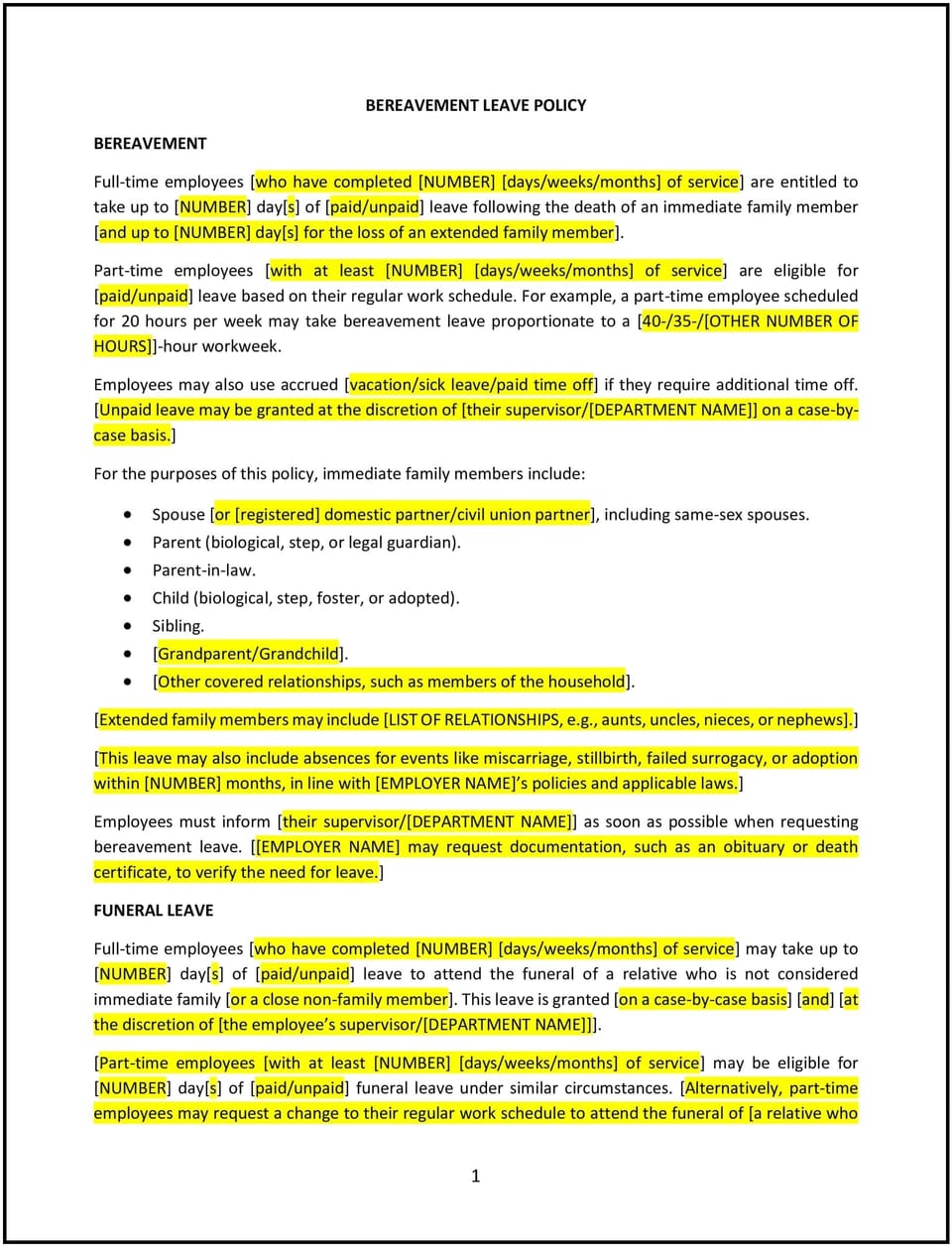Bereavement leave policy (Georgia): Free template

Bereavement leave policy (Georgia)
This bereavement leave policy is designed to help Georgia businesses support employees during times of loss by providing guidelines for taking leave following the death of a loved one. The policy outlines eligibility, duration, and the process for requesting bereavement leave, ensuring employees can focus on personal matters while maintaining workplace productivity.
By implementing this policy, businesses can demonstrate compassion, support employee well-being, and foster a respectful and empathetic workplace culture.
How to use this bereavement leave policy (Georgia)
- Define eligibility: Specify which employees are eligible for bereavement leave, including full-time, part-time, and temporary workers. Clearly state the types of relationships covered (e.g., immediate family members, extended relatives).
- Set leave duration: Outline the amount of leave provided, such as three to five days for the loss of an immediate family member and one to two days for extended relatives or others. Consider additional unpaid leave for special circumstances.
- Establish the approval process: Describe how employees should request bereavement leave, including notifying their supervisor or HR, and providing documentation if required (e.g., an obituary or funeral program).
- Address paid or unpaid leave: Clarify whether bereavement leave is paid or unpaid. If it is unpaid, provide options for employees to use accrued paid time off (PTO) or vacation days.
- Include special circumstances: Allow for flexibility in certain cases, such as travel requirements, cultural observances, or legal responsibilities related to the loss.
- Provide support resources: Offer information about resources available to grieving employees, such as employee assistance programs (EAPs) or counseling services.
- Review and update regularly: Ensure the policy is reviewed periodically to reflect changes in Georgia-specific laws, workplace practices, and employee needs.
Benefits of using this bereavement leave policy (Georgia)
Implementing this policy provides several advantages for Georgia businesses:
- Supports employee well-being: Compassionate leave policies help employees focus on personal matters during difficult times, improving morale and loyalty.
- Demonstrates empathy: A clear and fair policy shows employees that the business values their emotional health and family responsibilities.
- Reduces workplace disruptions: Providing structured leave allows businesses to manage absences effectively and maintain productivity.
- Promotes a respectful culture: Addressing bereavement thoughtfully fosters a workplace environment that respects diverse needs and experiences.
- Reflects Georgia-specific considerations: The policy can incorporate local cultural and legal factors unique to Georgia, ensuring relevance and appropriateness.
Tips for using this bereavement leave policy (Georgia)
- Communicate availability: Ensure employees are aware of the bereavement leave policy and understand how to request time off when needed.
- Be flexible: Recognize that grieving processes vary and accommodate employees’ unique needs, such as additional leave or adjusted schedules.
- Provide manager training: Train managers to handle bereavement requests with sensitivity and discretion, ensuring employees feel supported.
- Monitor usage patterns: Regularly review how the policy is being used and make adjustments to address employee feedback or evolving workplace needs.
- Offer follow-up support: Check in with employees after their leave to ensure they feel supported and are able to transition back to work smoothly.
Q: Who is considered an immediate family member for bereavement leave?
A: Immediate family members typically include spouses, children, parents, siblings, grandparents, and in-laws. Businesses should clearly define the relationships covered under the policy.
Q: How many days of bereavement leave are provided?
A: Businesses should offer three to five days for the loss of an immediate family member and one to two days for extended relatives or others. Additional unpaid leave may be available upon request.
Q: Can employees use PTO for bereavement leave?
A: If the bereavement leave is unpaid, businesses should allow employees to use accrued PTO or vacation days to cover the absence.
Q: Is documentation required for bereavement leave?
A: Businesses may request documentation, such as an obituary, funeral program, or other verification, but this requirement should be communicated respectfully and consistently.
Q: Are there provisions for extended leave due to travel or cultural observances?
A: Businesses should consider providing additional unpaid leave for employees who need to travel or observe cultural practices related to bereavement.
Q: What resources are available for grieving employees?
A: Businesses should provide information about resources such as employee assistance programs (EAPs), counseling, or community support groups to help employees during difficult times.
Q: How often should this policy be reviewed?
A: The policy should be reviewed annually or whenever there are changes to Georgia’s labor laws or workplace needs, ensuring it remains effective and relevant.
This article contains general legal information and does not contain legal advice. Cobrief is not a law firm or a substitute for an attorney or law firm. The law is complex and changes often. For legal advice, please ask a lawyer.


